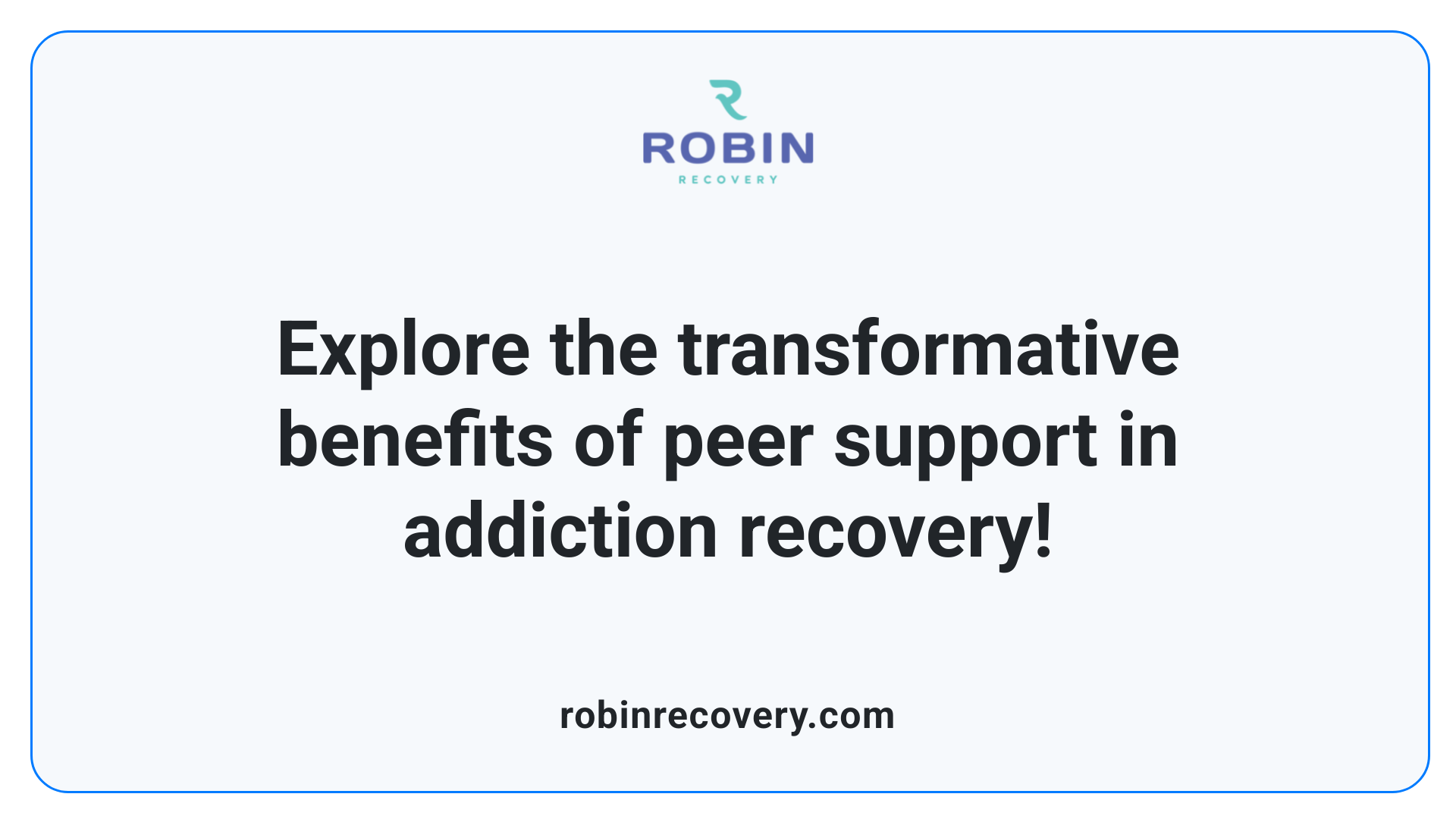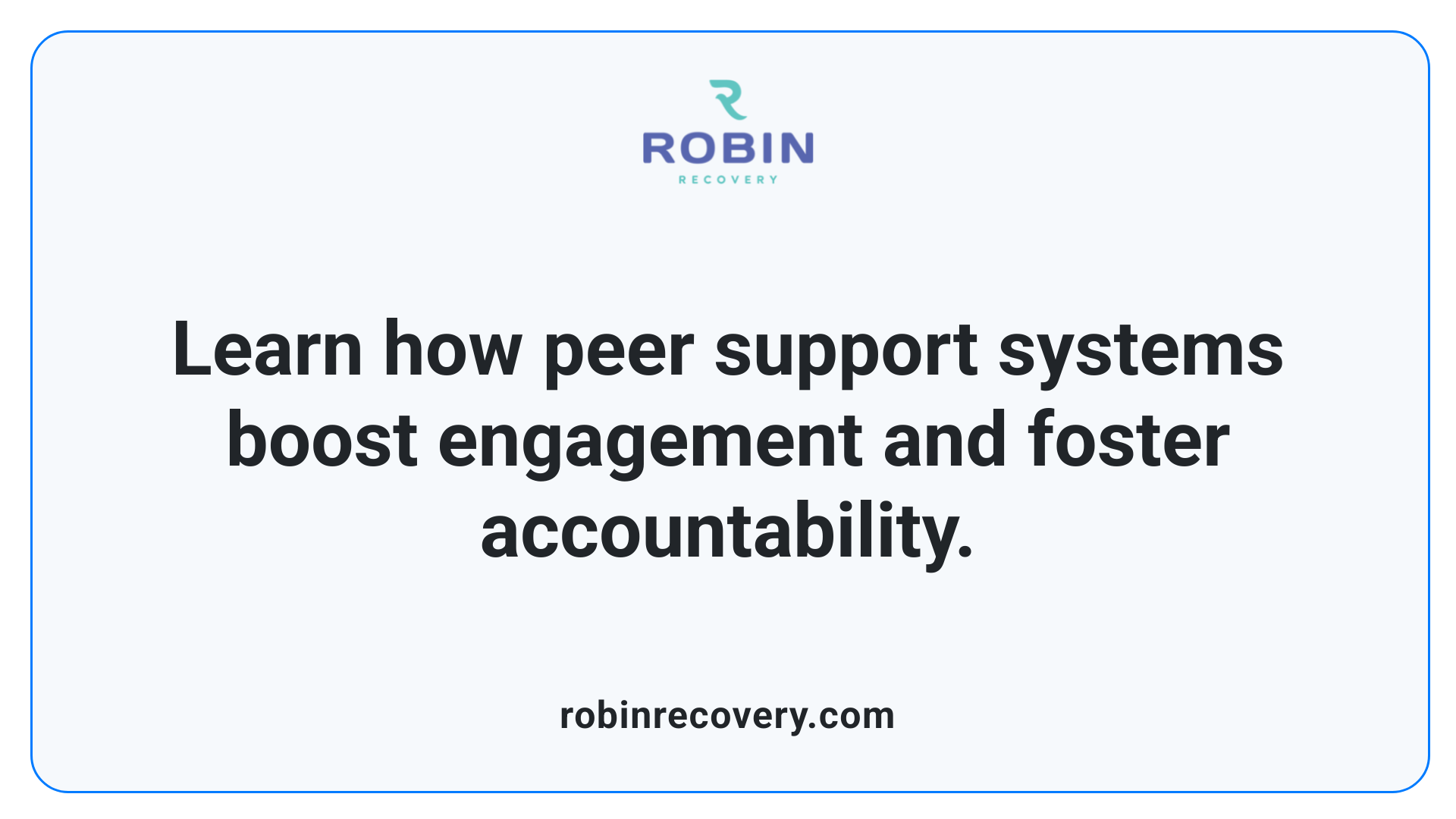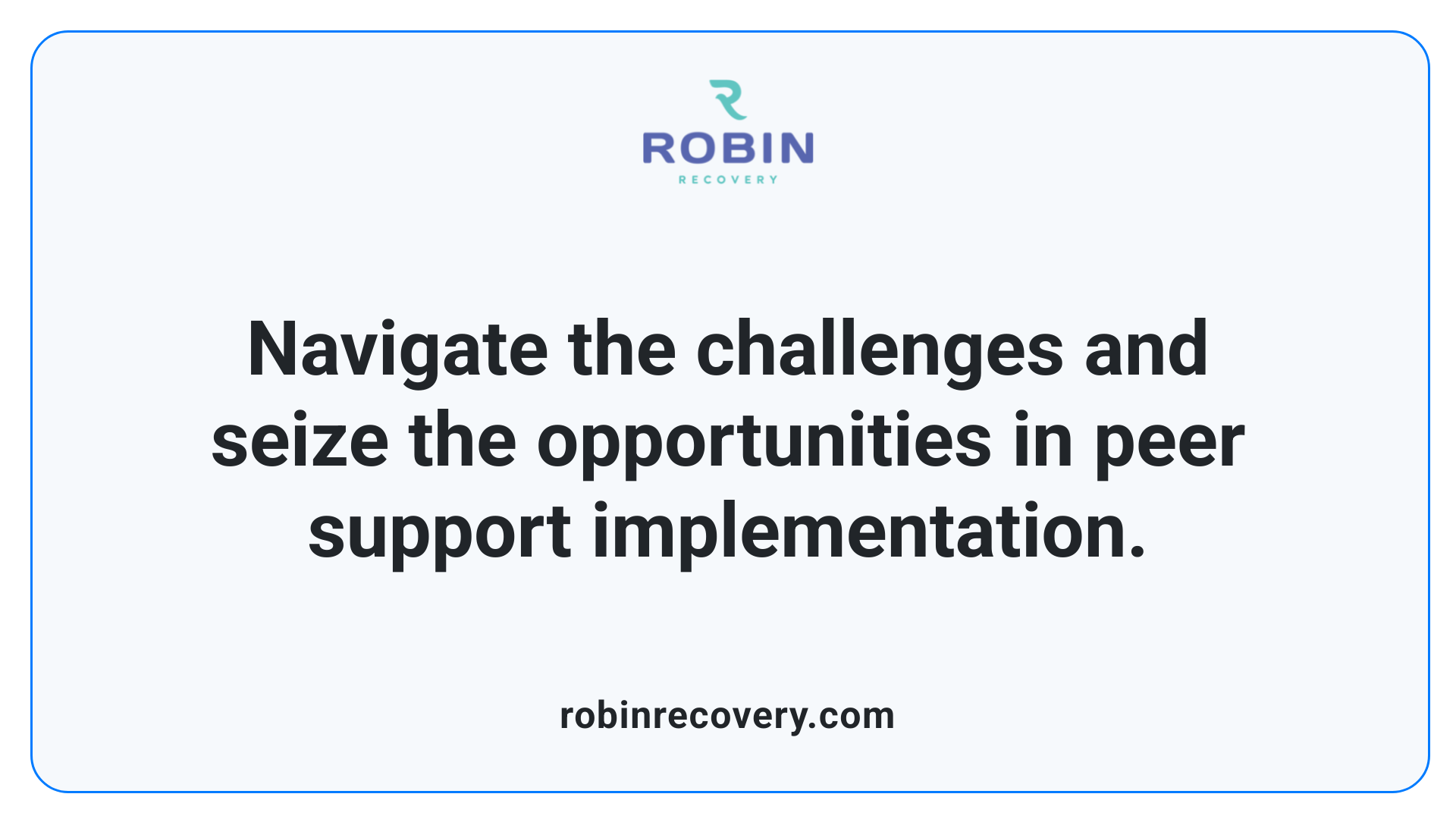The Benefits of Peer Support in Ambulatory Detox Programs

Understanding Peer Support in Addiction Recovery
In the realm of addiction treatment, peer support has emerged as a transformative element, particularly in ambulatory detox programs. These nonprofessional, yet profoundly impactful support systems offer a fusion of guidance, empathy, and shared experiences, creating a robust framework for individuals embarking on the challenging yet rewarding journey toward sobriety. This article delves into the multifaceted benefits of peer support, drawing insights from recent studies, expert opinions, and real-world applications, to unravel its potential in enhancing recovery outcomes and reinforcing engagement in detox processes.
The Role of Peer Support in Enhancing Detox Outcomes

What are the benefits of peer support groups in addiction treatment?
Peer support groups play a crucial role in addiction treatment by offering nonprofessional assistance from individuals who share similar experiences, fostering long-term recovery. Benefits of peer support include:
- Reduced Substance Use: Many studies indicate that participation helps decrease the amount and frequency of substance use.
- Increased Treatment Engagement: Individuals in peer support groups show higher adherence to treatment programs, leading to better completion rates.
- Improved Self-Efficacy: Participants often report boosts in confidence and a stronger sense of accountability for their recovery journey.
How does peer support affect recovery rates?
Evidence suggests that peer support has a spectacular impact on recovery rates. Engaging with peers—especially for those recently released from incarceration—can lead to:
- Higher Abstinence Rates: Studies have shown that individuals who participate in peer support programs have lower relapse rates, with one study noting a drop from 24% to just 7%.
- Longevity in Recovery: By fostering ongoing connections, peer groups help maintain recovery even after formal treatment ends, reinforcing support networks.
Evidence and studies supporting peer support
Numerous studies have documented the effectiveness of peer support in treatment programs. A meta-analysis of nine studies published in the journal Substance Abuse and Rehabilitation validates that:
- Enhanced Treatment Outcomes: Peer support groups are associated with better overall treatment outcomes, including improved mental health and reduced hospital admissions.
- Mutual Benefit: Both participants and mentors experience gains, such as sustained abstinence and increased self-esteem, illustrating a reciprocal relationship in recovery efforts.
Peer support not only transforms the individual experience but also builds a resilient community around addiction recovery.
Creating a Community Through Shared Experiences

Why are support groups important in addiction recovery?
Support groups play a vital role in addiction recovery by fostering a sense of community and belonging. For individuals grappling with substance use disorders, these groups can alleviate feelings of isolation. The chance to engage with others who have had similar experiences nurtures understanding, empathy, and shared healing.
Participation in support groups has been proven to significantly enhance treatment engagement. Studies show that individuals involved in peer support systems experience higher rates of abstinence when compared to those relying solely on traditional recovery methods. This is largely due to the emotional support provided, which boosts motivation and accountability among participants.
Moreover, the dynamic in these groups allows for the exchange of practical advice, as members share coping strategies that have worked for them. This exchange not only enriches individual recovery journeys but also strengthens the collective recovery experience.
Community building in peer support systems
Peer support groups create a foundational sense of community. They often meet in group settings where individuals can openly share their stories, thereby reducing stigma and shame surrounding addiction. This camaraderie builds trust and facilitates honest discussions about personal challenges, enabling individuals to feel understood and valued.
As members navigate their recovery journeys, they find encouragement in witnessing each other's successes, fostering a motivational environment that can significantly impact long-term recovery outcomes. By cultivating such strong connections, peer support groups don’t just aid in immediate recovery—they pave the way for enduring friendships that can provide ongoing support and accountability.
Mechanisms of Peer Support: Enhancing Engagement and Accountability

How does peer support enhance recovery outcomes and engagement?
Peer support significantly enhances recovery outcomes by creating vital connections among individuals with shared experiences of mental health and substance use challenges. In peer support groups, members find a welcoming environment that fosters acceptance and understanding. This unique aspect often contrasts with traditional treatment settings, where individuals may feel isolated or misunderstood.
Participants benefit from strengths-based guidance provided by peer supporters who draw from their own journeys to recovery. This approach not only empowers individuals to set personal goals but also equips them with practical strategies to navigate their recovery paths.
Innumerable studies indicate positive outcomes such as improved self-esteem, reduced psychiatric symptoms, and greater involvement in self-care activities when individuals engage in peer support. By promoting a sense of community and shared resilience, peer support plays a crucial role in sustaining recovery.
The role of accountability in peer support
Accountability is a cornerstone of effective peer support systems. Within these groups, participants help one another stay committed to their recovery goals by sharing their progress and experiences. This mutual responsibility encourages a culture of accountability that can be immensely beneficial on the road to recovery.
Being part of a peer support network cultivates a sense of obligation among members to support one another in maintaining sobriety. As individuals witness each other’s dedication and commitment, they are often inspired to remain steadfast in their own recovery journeys.
Ultimately, peer support helps decrease feelings of isolation by establishing strong relationships among group members. This framework not only allows individuals to hold each other accountable but also bolsters their collective motivation, making peer support an integral component of successful recovery.
Benefits of Peer SupportDescriptionImpact on Recovery Enhances engagement Creates a strong community feeling among participants Improved treatment adherence and satisfaction Encourages accountability Members support each other by tracking progress Decreased relapse rates and sustained sobriety Builds self-esteem Peer experiences provide inspiration and hope Greater confidence in recovery efforts Reduces isolation Fosters connections that make participants feel valued Increased motivation to pursue recovery
Peer Support as a Complementary Resource in Formal Treatment
What is the impact of peer-to-peer support on recovery?
Peer-to-peer support significantly impacts recovery by fostering a sense of companionship and understanding among individuals sharing similar experiences. This connection helps to reduce feelings of isolation, a common struggle for those in recovery. Research highlights that peer support enhances overall wellbeing, leading to improved self-esteem and social skills, which are crucial for successful recovery.
Moreover, active engagement in peer support has been linked to fewer hospital admissions, showcasing its efficacy in promoting health outcomes for individuals navigating the recovery journey. This kind of support does not just provide emotional and empathetic assistance; it encourages individuals to seek their own paths in recovery rather than relying solely on direct answers from professionals.
Integration of peer support in structured detox programs
Integrating peer support into formal detox programs enhances treatment effectiveness. It complements clinical services by creating a holistic approach to recovery that addresses both emotional and psychological needs. Participants in peer support groups are more likely to adhere to outpatient treatment by sharing their progress and experiences with others, fostering commitment and accountability.
These groups provide a structured environment where individuals can share their stories, reducing stigma and creating a nurturing community. Such environments motivate recovery by allowing members to learn from each other's experiences while building valuable coping skills for long-term sobriety.
To bolster the effectiveness of peer support, dedicated training programs are often implemented. These programs prepare peer supporters to provide meaningful assistance, ensuring they contribute positively to the overall recovery process. This model underscores the importance of a cooperative approach to recovery, combining professional treatment with valuable peer interaction.
Emotional and Practical Benefits of Peer Support Systems

Emotional Support in Peer Groups
Peer support groups serve as a sanctuary for individuals in recovery, offering emotional backing that greatly enhances their journey. These groups cultivate a strong sense of community, allowing members to share their experiences and feelings without fear of judgment. By connecting with others facing similar struggles, participants often feel understood, alleviating feelings of isolation and loneliness. This emotional solidarity can significantly foster a sense of belonging, which is crucial for maintaining sobriety and perseverance.
Moreover, peer groups provide a platform for emotional expression. Members can safely discuss feelings such as anxiety, guilt, or shame, directly addressing obstacles that may hinder their recovery. Acceptance and empathy within these groups bolster self-esteem, instilling participants with motivation to stay committed to their recovery goals.
Practical Advice and Peer-Driven Strategies
Alongside emotional support, peer groups are invaluable for sharing practical advice that stems from lived experiences. Participants often exchange coping strategies and share tools for managing stressors or avoiding triggers, making recovery more manageable. For instance, individuals may recommend specific apps or programs that have helped them maintain their sobriety.
Additionally, the mentorship aspect of peer support enhances learning opportunities. More experienced members offer guidance, dive into challenges, and provide actionable strategies to navigate the complexities of recovery. This peer-led approach not only reinforces accountability among group members but also builds essential skills that facilitate a sustainable recovery.
AspectDescriptionImpact Emotional Support Offers understanding and reduces isolation. Strengthens commitment to recovery. Practical Advice Participants share strategies for managing recovery challenges. Enhances coping skills and resilience. Mentorship Experienced peers provide guidance and share their success stories. Increases motivation and accountability.
Engagement and Support Beyond Formal Treatment
Sustainability of Peer Support After Treatment
Peer support extends well beyond the confines of formal treatment options. Many individuals find that continued engagement in peer support networks helps them maintain their sobriety after treatment has ended. This ongoing support often comes from groups that meet regularly, where individuals can share experiences, challenges, and victories.
Moreover, these groups help prevent feelings of isolation, reinforcing that recovery does not conclude once formal therapy ends. Participants often develop new friendships, which are crucial for emotional support and accountability.
The Continuity of Care Through Peer Networks
Peer support networks offer a seamless transition from structured treatment to everyday life. They create a robust system of care where individuals can access support whenever needed. This includes sharing resources, such as coping strategies and practical advice for managing triggers.
Such networks not only help maintain motivation but also cultivate a sense of mutual responsibility, encouraging ongoing commitment to sobriety. The relationships formed in these settings serve as powerful reminders that recovery is a journey, enriched by community and connection.
Challenges and Opportunities in Implementing Peer Support

Challenges in Integrating Peer Support in Detox Programs
Integrating peer support into detox programs can present several challenges. One significant issue is staff training; ensuring that existing personnel understand the roles and benefits of peer support is critical to successful implementation. Additionally, some traditional treatment models may resist incorporating peer-delivered services due to fears of undermining professional authority or concerns about the personal boundaries of peer mentors.
Another challenge is the funding of peer support initiatives. Many programs face budget constraints, making it hard to maintain peer support services or incentivize volunteers sufficiently. This lack of resources can hinder the expansion of peer support's reach, particularly in areas with high demand but limited access to treatment facilities.
Opportunities for Enhancing Peer Support Systems
Despite the hurdles, there are numerous opportunities to enhance peer support systems. For example, incorporating technology can facilitate virtual peer support groups, expanding access to individuals who may not be able to attend in person. This is especially beneficial for those in remote areas or facing transportation issues.
Additionally, fostering partnerships between peer support programs and established treatment facilities can create a more cohesive approach to addiction recovery. Training programs can be developed to equip peer mentors with essential skills, such as active listening and conflict resolution, enhancing the quality of support offered. Community engagement and awareness campaigns can also serve to destigmatize addiction, encouraging more individuals to seek help and participate in peer support initiatives.
Embracing Peer Support in Detox Programs
As the landscape of addiction recovery continues to evolve, ambulatory detox programs must harness the manifold benefits of peer support. By fostering a sense of community, accountability, and shared experience, peer support systems provide an invaluable complement to formal treatment methods. With the growing body of evidence supporting their efficacy, the integration of peer support into detox programs not only promises enhanced recovery outcomes but also empowers individuals with the sense of belonging and resiliency needed to sustain their journey toward sobriety. As such, stakeholders in addiction treatment are increasingly called upon to embrace and champion these peer-driven models of care.
References
- Benefits of peer support groups in the treatment of addiction - PMC
- National Helpline for Mental Health, Drug, Alcohol Issues - SAMHSA
- Benefits of Peer Support - Westwind Recovery® - California
- The Benefits of Peer Support in Recovery | 12-Step Programs
- The Importance of Peer Support in Outpatient Treatment Programs
- 10 Benefits of Peer Support in Addiction Recovery | All Points North
- The Importance of Peer Support in Recovery - Cobb Outpatient Detox
- The Importance of Peer Support in Addiction Recovery
- 6 Benefits of Peer Support for Addiction - Pyramid Healthcare
